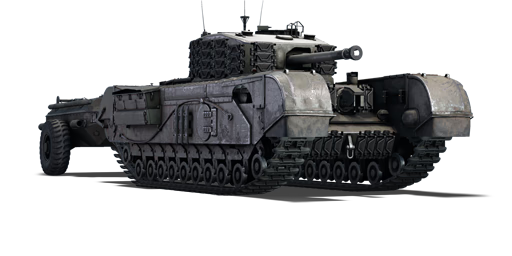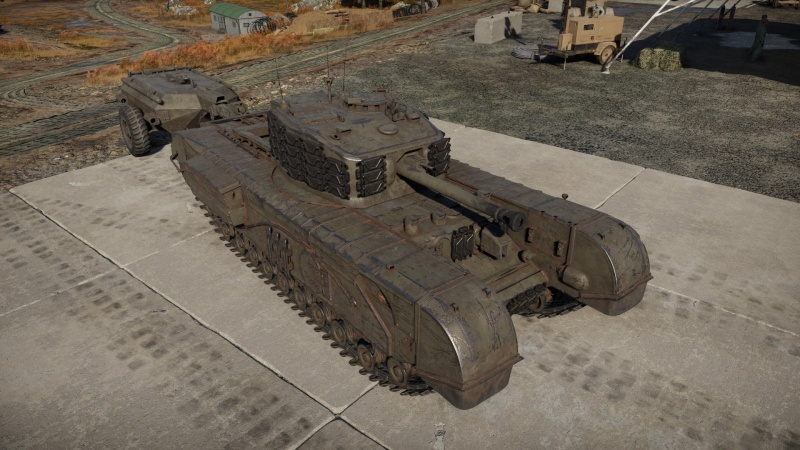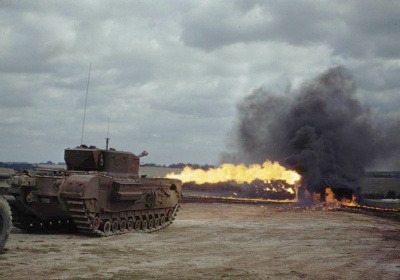Difference between revisions of "Churchill Crocodile"
(→Machine guns: Transferred from Flamethrower) |
(→History: Transferred from Flamethrower) |
||
| Line 202: | Line 202: | ||
== History == | == History == | ||
<!-- ''Describe the history of the creation and combat usage of the vehicle in more detail than in the introduction. If the historical reference turns out to be too long, take it to a separate article, taking a link to the article about the vehicle and adding a block "/History" (example: <nowiki>https://wiki.warthunder.com/(Vehicle-name)/History</nowiki>) and add a link to it here using the <code>main</code> template. Be sure to reference text and sources by using <code><nowiki><ref></ref></nowiki></code>, as well as adding them at the end of the article with <code><nowiki><references /></nowiki></code>. This section may also include the vehicle's dev blog entry (if applicable) and the in-game encyclopedia description (under <code><nowiki>=== In-game description ===</nowiki></code>, also if applicable).'' --> | <!-- ''Describe the history of the creation and combat usage of the vehicle in more detail than in the introduction. If the historical reference turns out to be too long, take it to a separate article, taking a link to the article about the vehicle and adding a block "/History" (example: <nowiki>https://wiki.warthunder.com/(Vehicle-name)/History</nowiki>) and add a link to it here using the <code>main</code> template. Be sure to reference text and sources by using <code><nowiki><ref></ref></nowiki></code>, as well as adding them at the end of the article with <code><nowiki><references /></nowiki></code>. This section may also include the vehicle's dev blog entry (if applicable) and the in-game encyclopedia description (under <code><nowiki>=== In-game description ===</nowiki></code>, also if applicable).'' --> | ||
| − | + | With the First World War bringing about the development of the tank and the flamethrower, different nations would devise ways to combine the two into a single weapon system during the interwar period. A mobile armoured flamethrower would allow the short-ranged weapon system to get close to the enemy with minimal risk from small-arms fire. | |
| + | |||
| + | [[File:Churchill Crocodile 1944.jpg|alt=Churchill Crocodile|thumb|right|400px|Churchill Crocodile firing its flamethrower]] | ||
| + | In Britain, efforts by the Petroleum Warfare Department (PWD), Associated Equipment Company (AEC), and Ministry of Supply (MoS) would lead to the development of a flamethrower tank based on the [[Churchill (Family)|Churchill]] infantry tank family. | ||
| + | |||
| + | This would be completed in the form of an fuel trailer towed behind the Churchill with lines connecting to a flame projector mounted in place of the bow machine gun. The trailer was lightly armoured and could resist light small-arms fire. If the trailer was destroyed or ran out of fuel, the crew could jettison it safely from the inside of the tank. | ||
| + | |||
| + | Churchill Crocodiles began service in the European Theatre in 1944 as part of specialized support units. The flamethrowers served as a potent psychological weapon as well, with many German troops choosing to surrender instead of being burned to death. They were deemed effective, despite their short range. | ||
| + | |||
| + | Crocodiles would go on to serve in the Korean War alongside other Churchill tanks until they were withdrawn from service in 1951. | ||
== Media == | == Media == | ||
Revision as of 11:27, 13 January 2023
| This page is about the premium British heavy tank Churchill Crocodile. For other versions, see Churchill (Family). |
Contents
Description
The Tank, Infantry, Mk IV, Churchill VII (A22F) Crocodile is a premium gift rank British heavy tank with a battle rating of (AB), (RB), and (SB). It was introduced in Update "Fire and Ice" as a reward for Battle Pass: Season IX, "Smell of Victory".
General info
Survivability and armour
Describe armour protection. Note the most well protected and key weak areas. Appreciate the layout of modules as well as the number and location of crew members. Is the level of armour protection sufficient, is the placement of modules helpful for survival in combat? If necessary use a visual template to indicate the most secure and weak zones of the armour.
Armour type:
| Armour | Front (Slope angle) | Sides | Rear | Roof |
|---|---|---|---|---|
| Hull | 152 mm Front Plate 57.15 mm (66-67°) Front Glacis 139 mm (24°) Lower Glacis 95 mm Flamethrower Port |
95 mm | 50.8 mm (1°) Top 25.4 mm (64°) Bottom |
15.88-19.05 mm |
| Turret | 152 mm (20°) Turret Front 152 mm (26°) Gun Mantlet |
95.25 mm | 95.25 mm (1°) | 20 mm |
| Cupola | 152 mm | 152 mm | 152 mm | 20 mm |
Notes:
Mobility
Write about the mobility of the ground vehicle. Estimate the specific power and manoeuvrability, as well as the maximum speed forwards and backwards.
| Game Mode | Max Speed (km/h) | Weight (tons) | Engine power (horsepower) | Power-to-weight ratio (hp/ton) | |||
|---|---|---|---|---|---|---|---|
| Forward | Reverse | Stock | Upgraded | Stock | Upgraded | ||
| Arcade | Expression error: Unexpected * operator. | _,___ | __.__ | __.__ | |||
| Realistic | _,___ | __.__ | __.__ | ||||
Modifications and economy
Armaments
Main armament
Give the reader information about the characteristics of the main gun. Assess its effectiveness in a battle based on the reloading speed, ballistics and the power of shells. Do not forget about the flexibility of the fire, that is how quickly the cannon can be aimed at the target, open fire on it and aim at another enemy. Add a link to the main article on the gun: {{main|Name of the weapon}}. Describe in general terms the ammunition available for the main gun. Give advice on how to use them and how to fill the ammunition storage.
| 75 mm OQF Mk.V | Turret rotation speed (°/s) | Reloading rate (seconds) | |||||||||||
|---|---|---|---|---|---|---|---|---|---|---|---|---|---|
| Mode | Capacity | Vertical | Horizontal | Stabilizer | Stock | Upgraded | Full | Expert | Aced | Stock | Full | Expert | Aced |
| Arcade | 84 | -12°/+20° | ±180° | N/A | __._ | __._ | __._ | __._ | __._ | _.__ | _.__ | _.__ | _.__ |
| Realistic | __._ | __._ | __._ | __._ | __._ | ||||||||
Ammunition
| Penetration statistics | |||||||
|---|---|---|---|---|---|---|---|
| Ammunition | Type of warhead |
Penetration @ 0° Angle of Attack (mm) | |||||
| 10 m | 100 m | 500 m | 1,000 m | 1,500 m | 2,000 m | ||
| M72 shot | AP | 91 | 88 | 78 | 67 | 57 | 49 |
| M61 shot | APCBC | 103 | 100 | 89 | 77 | 66 | 57 |
| M48 shell | HE | 10 | 10 | 10 | 10 | 10 | 10 |
| Shell details | |||||||||
|---|---|---|---|---|---|---|---|---|---|
| Ammunition | Type of warhead |
Velocity (m/s) |
Projectile mass (kg) |
Fuse delay (m) |
Fuse sensitivity (mm) |
Explosive mass (TNT equivalent) (g) |
Ricochet | ||
| 0% | 50% | 100% | |||||||
| M72 shot | AP | 619 | 6.3 | N/A | N/A | N/A | 47° | 60° | 65° |
| M61 shot | APCBC | 618 | 6.53 | N/A | N/A | N/A | 48° | 63° | 71° |
| M48 shell | HE | 463 | 6.3 | 0 | 0.1 | 666 | 79° | 80° | 81° |
| Smoke shell characteristics | ||||||
|---|---|---|---|---|---|---|
| Ammunition | Velocity (m/s) |
Projectile mass (kg) |
Screen radius (m) |
Screen deploy time (s) |
Screen hold time (s) |
Explosive mass (TNT equivalent) (g) |
| M89 | 259 | 3 | 13 | 5 | 20 | 50 |
Ammo racks
| Full ammo |
1st rack empty |
2nd rack empty |
3rd rack empty |
4th rack empty |
5th rack empty |
6th rack empty |
Visual discrepancy |
|---|---|---|---|---|---|---|---|
| 84 | __ (+__) | __ (+__) | __ (+__) | __ (+__) | __ (+__) | __ (+__) | __ |
Machine guns
As the flamethrower is unable to penetrate fully armoured vehicles, it is ineffective damage-wise against most tanks that a player will encounter. Due to the weight of fuel, flamethrowers can only hit targets at relatively short ranges.
However, this weapon is particularly useful for eliminating exposed crew members in open-topped vehicles and SPAA. For example, if a Churchill Crocodile shot flames at a Pz.IV H, it would take no damage. A Sd.Kfz. 6/2, however, would be burnt down within a few seconds.
This weapon is located in the bow gun position, replacing the machine gun mounted in the regular Churchill VII. As such, it has a very limited traverse and is dependent on the hull position for horizontal targeting. Vertical guidance is quite good, which can allow it to reach targets at short ranges outside of point-blank. Unfortunately, the slow speed of the Crocodile can make it difficult to get within range, so players will need to use the vertical limit to 'lob' shots onto the enemy.
In attacking enemies that are fully armoured, a Churchill Crocodile can use its flamethrower to temporarily blind or distract the enemy. Fully armoured vehicles can be shot with flames to blind and confuse them which can allow the Crocodile to shoot back or reposition itself. Fire can serve as a deterrent to vehicles with exposed crew from getting too close, something that can be problematic for a Churchill tank.
It should be noted that since this weapon is very unique, enemies will know a Churchill Crocodile is around when the flamethrower is used. When it is not in use, the fuel trailer is a major indicator of the vehicle. If this fuel tank is destroyed, it will explode. The tank crew will be unharmed, but the weapon system will be rendered unusable.
| Flamethrower | ||||
|---|---|---|---|---|
| Mount | Capacity (Belt) | Fire rate | Vertical | Horizontal |
| Hull | 800 (800) | 1,200 | -5°/+30° | ±15° |
| 7.92 mm BESA | ||||
|---|---|---|---|---|
| Mount | Capacity (Belt) | Fire rate | Vertical | Horizontal |
| Coaxial | 9,450 (225) | 600 | N/A | N/A |
Usage in battles
The Churchill Crocodile is not too different from the Churchill VII, being a modified version with a flamethrower weapon in the bow gunner position.
The flamethrower is useful against open-topped vehicle, but otherwise the Churchill Crocodile's offensive capabilities remain the same as the Churchill VII with the 75 mm gun. Due to the 75 mm's low penetration and situational use of the flamethrower, it is recommended to work and rely on teammates to help destroy the enemy.
Pros and cons
Pros:
- Access to a flamethrower, effective against open topped vehicles
- Same tough armour of the Churchill VII
Cons:
- Flamethrower fuel is vulnerable to being shot
- Inadequate 75 mm gun, same as the one on the Churchill VII
- Slow reverse speed
History
With the First World War bringing about the development of the tank and the flamethrower, different nations would devise ways to combine the two into a single weapon system during the interwar period. A mobile armoured flamethrower would allow the short-ranged weapon system to get close to the enemy with minimal risk from small-arms fire.
In Britain, efforts by the Petroleum Warfare Department (PWD), Associated Equipment Company (AEC), and Ministry of Supply (MoS) would lead to the development of a flamethrower tank based on the Churchill infantry tank family.
This would be completed in the form of an fuel trailer towed behind the Churchill with lines connecting to a flame projector mounted in place of the bow machine gun. The trailer was lightly armoured and could resist light small-arms fire. If the trailer was destroyed or ran out of fuel, the crew could jettison it safely from the inside of the tank.
Churchill Crocodiles began service in the European Theatre in 1944 as part of specialized support units. The flamethrowers served as a potent psychological weapon as well, with many German troops choosing to surrender instead of being burned to death. They were deemed effective, despite their short range.
Crocodiles would go on to serve in the Korean War alongside other Churchill tanks until they were withdrawn from service in 1951.
Media
- Videos
See also
Links to the articles on the War Thunder Wiki that you think will be useful for the reader, for example:
- reference to the series of the vehicles;
- links to approximate analogues of other nations and research trees.
External links
| Britain heavy tanks | |
|---|---|
| Matilda | Matilda III · Matilda Hedgehog |
| Churchill | Churchill I · Churchill III · Churchill VII · Churchill Crocodile · Churchill NA75 · Black Prince |
| Post-war | Caernarvon · Conqueror |
| Other | Independent · Excelsior · TOG II |
| Britain premium ground vehicles | |
|---|---|
| Light tanks | A13 Mk I (3rd R.T.R.) · A13 Mk II 1939 · AEC Mk II · Crusader "The Saint" · Rooikat 105 |
| Medium tanks | A.C.I · Grant I · Cromwell V (RP-3) · Sherman IC "Trzyniec" · A.C.IV · Comet I "Iron Duke IV" |
| Centurion Mk.2 · ▄Strv 81 (RB 52) · Centurion Mk.5 AVRE · Centurion Mk.5/1 · ▄Sho't Kal Dalet · Centurion Action X | |
| Vijayanta · Khalid · Challenger DS · Challenger 2 OES | |
| Heavy tanks | Independent · Matilda Hedgehog · Excelsior · TOG II · Churchill Crocodile · Black Prince |
| Tank destroyers | Alecto I · Achilles (65 Rg.) · QF 3.7 Ram |






